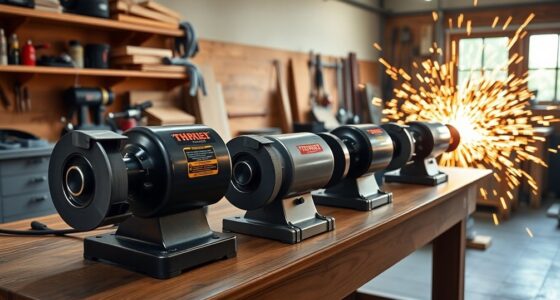I've checked out the top 15 fuels for alcohol stoves, and you'll find some great options for outdoor cooking. Denatured alcohol is my go-to; it's easy to find and burns cleanly. Bioethanol fuel is eco-friendly and perfect for longer cooking times. For those camping trips, solid fuel tablets are lightweight and hassle-free but might require a few more to get the job done. If you're after efficiency, white gas and gel fuel also have their perks. Each fuel type comes with its own set of advantages, so keep exploring to uncover what fits your outdoor cooking needs best!
Key Takeaways
- Denatured alcohol is widely available, clean-burning, and ideal for outdoor cooking, producing less soot than solid fuel tablets.
- Bioethanol fuel offers an eco-friendly option with a long burn time, emitting no soot, ash, or smoke, suitable for well-ventilated areas.
- Solid fuel tablets are lightweight and portable, perfect for camping, but burn for a shorter duration, usually around 15 minutes.
- White gas provides high performance in extreme temperatures but is pricier, making it a choice for serious campers and backpackers.
- Gel fuel burns without soot or smoke, offering bright flames and long burn times, making it an excellent option for both indoor and outdoor use.
Coghlans Fuel Stove Tablets, 24-Count
If you're looking for a reliable and compact fuel option for your next camping trip or emergency kit, Coghlans Fuel Stove Tablets are an excellent choice. These 24-count tablets are designed to work perfectly with Coghlan's Emergency Stove. They're safe, clean-burning, and non-toxic, so you won't have to worry about strong odors or harmful emissions. I love that they boil a cup of water in just about three minutes with only two tablets. Plus, their compact size makes them easy to pack. Although some users mention needing a few more tablets for tougher cooking tasks, I've found them effective for quick meals and emergency situations. Overall, they're a solid addition to any outdoor cooking setup.
Best For: Outdoor enthusiasts, campers, and individuals preparing emergency kits who need a compact and reliable fuel source.
Pros:
- Compact and lightweight, easy to carry.
- Safe, clean-burning, and odorless for versatile cooking needs.
- Effective for quick meals and emergency situations.
Cons:
- Some users report difficulty in boiling water compared to other brands.
- May leave unburnt residue and require more tablets for significant heating tasks.
- Performance can struggle in damp conditions for fire-starting.
Fireplace Fuel, Bio-Ethanol for Table Top Fire Pit & Ethanol Fireplaces
For anyone seeking a clean and eco-friendly option for their tabletop fire pits or ethanol fireplaces, ECOHEAT Fireplace Fuel stands out as the best choice. This bio-ethanol fuel burns cleanly, producing no soot or hazardous fumes, making it perfect for indoor and outdoor use. I appreciate how it comes in a convenient 1-gallon package, which is easy to pour and handle. Plus, it's made right here in the USA. Customers rate it 4.1 out of 5 stars, praising its low odor and secure bottles. Just remember, it's critical to avoid pouring it on an open flame. With ECOHEAT, I feel confident I'm making an eco-conscious choice for my fire features.
Best For: Those looking for a clean, eco-friendly fuel option for indoor and outdoor tabletop fire pits and ethanol fireplaces.
Pros:
- Low odor and clean-burning, producing no soot or hazardous fumes.
- Convenient 1-gallon package that is easy to pour and handle.
- Made in the USA with secure bottles for safe storage.
Cons:
- Product received is a 4-pack of 32 oz bottles totaling 1 gallon, which may confuse some customers expecting 4 gallons.
- Requires caution to avoid pouring on open flames or hot burners.
- Pricing may be considered high compared to other fuel options, despite being competitive in its category.
Portable Outdoor Mini Alcohol Stove Burner for Camping
The Portable Outdoor Mini Alcohol Stove Burner is perfect for campers and backpackers who value lightweight gear without sacrificing performance. Weighing just 145 grams and measuring 3.86 x 3.86 x 2.29 inches, it's ultra-portable and easy to pack. The aluminum alloy stand and brass burner guarantee durability while the windproof design enhances efficiency. I love the variable flame control, making it simple to adjust heat for cooking. Plus, with a runtime of approximately 50 minutes on 100ml of high-concentration alcohol, it gets the job done effectively. Just remember to use it on a flat surface and keep an eye on it while it's burning. Overall, it's a fantastic choice for outdoor cooking adventures.
Best For: Outdoor enthusiasts such as campers, backpackers, and hikers looking for a lightweight and efficient cooking solution.
Pros:
- Compact and lightweight design makes it easy to carry and store.
- Variable flame control allows for precise cooking and heat adjustments.
- Windproof feature enhances cooking efficiency in outdoor conditions.
Cons:
- Durability concerns as some users report the stand can bend easily with heavier pots.
- Requires careful handling to avoid overflow and ensure safety during use.
- Limited fuel capacity with a 50-minute burn time on 100ml of alcohol, necessitating frequent refueling for longer cooking sessions.
Godora Solid Fuel Tablets for Backpacking and Camping
Godora Solid Fuel Tablets are perfect for backpackers and campers who need a reliable, compact fuel source. Each 15-gram tablet burns for about 15 minutes and can heat up to 1300°F, boiling 500ml of water in just 8 minutes. I love how they're 100% waterproof and fit right in my pocket. These tablets can be stored for over ten years without any evaporation, making them a fantastic choice for emergency kits. Users rave about their performance, especially when shielded from the wind. Plus, they're smokeless and leave no residue, so cooking is hassle-free. If you're looking for a cost-effective, efficient alternative to traditional fuels, I highly recommend giving Godora tablets a try for your next outdoor adventure!
Best For: Backpackers, campers, and outdoor enthusiasts seeking a reliable and efficient solid fuel source for cooking and heating.
Pros:
- Compact and waterproof design allows for easy carrying and long-term storage.
- Burns efficiently with high heat output, ideal for boiling water and cooking meals quickly.
- Smokeless and residue-free, making it suitable for various cooking scenarios.
Cons:
- Some users may receive broken tablets, although performance remains satisfactory.
- Odor can be noted when burning, which may not be preferred by all users.
- Requires wind protection for optimal performance in breezy conditions.
2 Pack Portable Solid Fuel Stove for Camping
Camping enthusiasts will appreciate the Pack Portable Solid Fuel Stove for its compact and foldable design, making it easy to carry on any outdoor adventure. Weighing in at just 7 ounces and measuring 3.78 x 3 x 2.17 inches, it fits perfectly in my backpack. This stove burns a variety of materials, from dried branches to solid fuel tablets, allowing me to cook nearly anywhere. I've found it particularly effective in windy conditions, thanks to its adjustable angle. Plus, I love that I can store fuel tablets inside for convenience. With an average rating of 3.7 stars, it's a reliable option for camping, hiking, or a picnic. Don't forget to use aluminum foil as a windscreen for best results!
Best For: Outdoor enthusiasts, campers, and hikers seeking a lightweight and portable cooking solution for their adventures.
Pros:
- Lightweight and compact design makes it easy to carry and store.
- Versatile fuel compatibility allows for cooking with various materials, enhancing convenience.
- Stability in windy conditions ensures reliable performance during outdoor cooking.
Cons:
- Average rating of 3.7 stars may indicate mixed customer satisfaction.
- Requires additional accessories like aluminum foil for optimal use as a windscreen.
- Limited cooking capacity may not be suitable for larger groups or meals.
Real Flame Gel Fuel Cans – 24-Pack
For those seeking a reliable and efficient fuel source for their alcohol stoves, the Real Flame Gel Fuel Cans – 24-Pack is an excellent choice. These 13-ounce cans provide a generous supply, perfect for both indoor and outdoor use. I love how they create bright, crackling flames that mimic a real fire, adding a cozy ambiance to my cooking experience. With up to 3000 BTUs of heat, each can burns for 2.5 to 3 hours, ensuring warmth without the mess of wood. Plus, they're made from environmentally friendly gelled isopropyl alcohol, leaving no soot or smoke behind. I've found them to be long-lasting and low-odor compared to other brands, making them a top pick for my outdoor adventures.
Best For: Those looking for a clean-burning, efficient fuel source for indoor and outdoor fireplaces and fire pits.
Pros:
- Produces bright, crackling flames that enhance ambiance.
- Environmentally friendly, leaves no soot, ash, or smoke.
- Long burn time of 2.5 to 3 hours with up to 3000 BTUs of heat.
Cons:
- Some users may notice a slight alcohol smell.
- Requires proper ventilation in enclosed spaces.
- Limited to use in approved fireplaces, fire pits, and fire bowls.
Bioethanol Fuel Tabletop Firepit (3 Pack 0.5Lt)
If you're looking for a versatile and eco-friendly fuel option, the Bioethanol Fuel Tabletop Firepit (3 Pack 0.5Lt) is an excellent choice. This bioethanol fuel burns cleanly and smokelessly, making it perfect for both indoor and outdoor use. I love that it's odorless and leaves no harmful pollutants, which is great for the environment. With three 0.5-liter bottles, I can easily fuel my tabletop fireplaces, stoves, or even fire pits for cooking or warming food. Just remember to use it in well-ventilated areas and avoid mixing fuels. While some users have noted a slight smell when opening the bottle, the burning experience is entirely pleasant. Overall, it's a reliable and efficient fuel option for any outdoor cooking adventure.
Best For: Those seeking an eco-friendly, versatile fuel option for indoor and outdoor fireplaces, stoves, and fire pits.
Pros:
- Burns cleanly and smokelessly, producing no harmful pollutants.
- Ideal for various applications, including cooking, warming, and outdoor activities.
- Comes in a convenient 3-pack, providing ample fuel for multiple uses.
Cons:
- Some users report a noticeable smell when opening the bottles.
- Burn time may vary, with some finding it shorter than expected.
- Requires careful handling and adherence to safety guidelines.
Bioethanol Fuel Tabletop Firepit (1.06 Quart)
Looking for a clean-burning fuel option that's versatile enough for both indoor and outdoor use? The Bioethanol Fuel Tabletop Firepit (1.06 Quart) by Magic Chems is a fantastic choice. With its compact size of 3.5D x 3.5W x 9.5H inches and lightweight design at just 1.72 pounds, it's perfect for any setting. This fuel is denatured ethanol, making it odorless and non-toxic, so you won't have to worry about harmful emissions. It's ideal for various applications, from camping to cozy nights at home. Just remember to use it in well-ventilated areas and never leave it unattended. With a solid 4.4-star rating, many users love its clean burn and reliable heat output—making outdoor cooking a breeze!
Best For: Those seeking a versatile, clean-burning fuel option for both indoor and outdoor use, especially for camping, cooking, and home fireplaces.
Pros:
- Burns cleanly without producing unpleasant odors.
- Convenient and lightweight design makes it easy to transport.
- Suitable for a variety of applications, including tabletop fire pits and camping stoves.
Cons:
- Some users report a lingering odor when the fuel is nearly depleted.
- Requires regular maintenance to remove soot and debris.
- Must be used in well-ventilated areas to ensure safety.
MSR Super Fuel White Gas for Camping and Backpacking Liquid Fuel Stoves
MSR Super Fuel White Gas stands out as a top choice for campers and backpackers who demand high performance from their liquid fuel stoves. I've found this fuel to be incredibly reliable, especially in cold conditions. Its clean-burning formula means I don't have to deal with clogs or messy cleanups, allowing me to focus on cooking rather than maintenance. Plus, it's 100% pure, which enhances my stove's efficiency. Each 1-quart canister is easy to pack, weighing only 1.6 pounds, making it a practical option for my outdoor adventures. Although it's a bit pricier than other fuels, the performance and quality make it worth every penny. If you want a dependable burn, MSR Super Fuel is definitely the way to go.
Best For: Campers and backpackers seeking high-performance, clean-burning fuel for their stoves, especially in cold conditions.
Pros:
- Burns clean and hot, enhancing cooking efficiency.
- Effective for use in extremely cold temperatures (below 0°F).
- Reduces the need for frequent maintenance due to its clean-burning formula.
Cons:
- Higher price point compared to other liquid fuels.
- Some customers report discrepancies between advertised and received quantities.
- Limited availability may pose a challenge for some users.
Coghlans Stove
The Coghlans Stove stands out as an excellent choice for campers and outdoor enthusiasts who value portability and versatility. With its fold-flat design and lightweight construction, I can easily pack it in my backpack without adding much weight. Measuring 6.5 inches square and 5 inches tall, it fits snugly in tight spaces. I appreciate its dual fuel capability, allowing me to use solid fuel or canned heat, making it adaptable for various cooking situations. The sturdy alloy steel design supports larger pots, and the wind-protecting sides keep my flame steady. Plus, at around $20, it's an affordable investment for emergencies or outdoor adventures. Many users rave about its reliability, and I can see why—I'm definitely planning to grab another!
Best For: The Coghlans Stove is best for campers, backpackers, and outdoor enthusiasts seeking a lightweight, portable cooking solution.
Pros:
- Versatile fuel options allow for use with solid fuel or canned heat, accommodating various cooking needs.
- Compact and foldable design makes it easy to store and transport, fitting neatly in backpacks.
- Sturdy construction supports larger cookware and provides wind protection for a steady flame.
Cons:
- Some users have reported minor issues with the door latching mechanism.
- Limited cooking space due to its small dimensions, which may not accommodate larger pots.
- Performance might vary with different alternative fuels, requiring experimentation for optimal results.
Vargo Titanium Triad Multi-Fuel Stove
For those who prioritize lightweight and compact gear during their outdoor adventures, the Vargo Titanium Triad Multi-Fuel Stove stands out as an excellent choice. Weighing just 0.1 pounds and folding down to a mere 2.9 inches, it's perfect for backpackers and bike packers alike. Its solid titanium construction guarantees durability without the bulk. I love its multi-fuel capability, allowing me to use alcohol, tabs, or gel, which really adds to my flexibility on the trail. Boiling 1.5 cups of water takes about six minutes, and with a windscreen, it's effective even in breezy conditions. While some users suggest using a primer pan for quicker ignition, I find it reliable and easy to maintain, making it a fantastic addition to my outdoor cooking gear.
Best For: Those seeking a lightweight and compact cooking solution for backpacking or bike packing adventures.
Pros:
- Lightweight and compact design makes it easy to carry on long hikes.
- Multi-fuel capability allows versatility in fuel choice, enhancing trail flexibility.
- Reliable performance with minimal maintenance required, ideal for outdoor cooking.
Cons:
- Requires a primer pan for quicker ignition, which may be an added expense.
- Boil time may exceed claims without modifications, potentially disappointing some users.
- Performance may struggle in extreme cold or high altitudes compared to other stoves.
2 In 1 Mini Alcohol Stove for Camping
Looking for a compact and versatile solution for your camping needs? The 2 In 1 Mini Alcohol Stove is an excellent choice. Weighing just 8 ounces and measuring 3.9 x 3.9 x 3.1 inches, it easily fits in your pack. This stove offers a windscreen base for larger pots and a stainless cross stand for small mugs, making it adaptable for various cooking tasks. I love that it burns cleaner than petroleum fuels, and with 95% isopropyl alcohol, it provides around 30 minutes of stable heat. The adjustable flame handle lets me simmer or extinguish with ease. While it's sturdy and effective, I've found it struggles a bit in windy conditions, so I keep that in mind when choosing my cooking spot.
Best For: Campers and outdoor enthusiasts seeking a lightweight and efficient cooking solution for their adventures.
Pros:
- Compact and lightweight design makes it easy to transport in any backpack.
- Versatile cooking options with two types of stove holders for different pot sizes.
- Fuel-efficient with clean burning alcohol, providing stable heat for various cooking tasks.
Cons:
- Performance can be affected by windy conditions, making it less effective outdoors without protection.
- Some users report difficulty unscrewing the cap for refueling.
- Soot production may occur when using isopropyl alcohol, limiting indoor use.
Esbit Brass Alcohol Burner Camping Stove with Variable Temperature Control
With its lightweight design and variable temperature control, the Esbit Brass Alcohol Burner Camping Stove is ideal for backpackers seeking simplicity and reliability on their adventures. Weighing just 0.09 kg and measuring only 3 x 1.81 x 0.5 inches, it's a compact option that easily fits into any pack. I love that it uses readily available denatured alcohol, making refueling a breeze. The built-in flame regulator and snuffer allow me to adjust the heat as needed, which is a game-changer for cooking. While it can take around 15 minutes to boil water with 70ml of alcohol, I've found it performs best with a windscreen. Just remember to use high-proof alcohol for peak results and keep safety in mind with that near-invisible flame!
Best For: Backpackers and campers seeking a lightweight, reliable stove for cooking with ease and simplicity.
Pros:
- Compact and lightweight design makes it easy to carry on long trips.
- Uses readily available denatured alcohol for convenient refueling.
- Variable temperature control allows for precise cooking adjustments.
Cons:
- Flame can be difficult to see in daylight, posing safety concerns.
- Takes approximately 15 minutes to boil water, which may not be ideal for quick meals.
- Requires safety precautions due to the near-invisible flame during use.
2 Pcs Spirit Stove, Portable Foldable Barbecue Stove for Outdoor Camping
The 2 Pcs Spirit Stove is a game changer for outdoor enthusiasts who crave convenience and portability during their adventures. This portable foldable barbecue stove, made from high-quality galvanized iron, is incredibly lightweight at just 113 grams, making it easy to toss in my backpack. With dimensions of about 9.5 x 7.5 x 5.5 cm, it fits perfectly in my pocket. I appreciate its compatibility with solid fuel blocks and wax blocks, providing instant heat for cooking. The foldable design guarantees I can set it up quickly, whether I'm camping or having a picnic. Plus, with a solid customer rating of 4.7 out of 5 stars, it's clear I'm not alone in my admiration for this handy stove.
Best For: Outdoor enthusiasts and campers who need a lightweight and portable cooking solution.
Pros:
- Ultra-lightweight design at only 113 grams, making it easy to carry on trips.
- Foldable for convenient storage and quick setup during outdoor activities.
- Compatible with solid fuel blocks for instant heat, ideal for cooking meals or boiling water.
Cons:
- Limited cooking capacity due to its small size, which may not suit larger groups.
- Requires solid fuel blocks that may not be readily available everywhere.
- Not suitable for use in windy conditions, as it may affect stability and cooking efficiency.
Solid Fuel Tablet Pocket Stove for Camping and Hiking
For those who love camping, hiking, or picnicking, the Solid Fuel Tablet Pocket Stove offers a compact and efficient solution for cooking on the go. Weighing just 3.52 ounces and folding to a mere 3.9 x 2.95 inches, it's incredibly portable. I appreciate its sturdy galvanized plates, which provide excellent stability, allowing me to easily boil 500 ml of water in about five minutes using solid fuel tablets. This stove can handle up to 7 kg and accommodates various fuel options like alcohol blocks or even small twigs. With a customer rating of 4.1 stars, it's proven reliable for outdoor cooking. Just remember to pack a carrying pouch for added convenience!
Best For: Outdoor enthusiasts looking for a lightweight and compact cooking solution while camping, hiking, or picnicking.
Pros:
- Ultra-portable design makes it easy to carry and store.
- Sturdy construction ensures stability and durability during use.
- Versatile fuel options allow for various cooking methods with solid or alternative fuels.
Cons:
- No carrying pouch included, which may reduce convenience for transport.
- Limited cooking capacity, only supports up to a 6-inch pot.
- Boiling time may vary based on environmental conditions and fuel type used.
Factors to Consider When Choosing Fuel for Alcohol Stove

When I choose fuel for my alcohol stove, I consider several key factors. It's important to weigh the type of fuel, its burn efficiency, and how easy it is to find and afford. Plus, I can't ignore the environmental impact and how well it stores over time.
Fuel Type Options
Choosing the right fuel for your alcohol stove can greatly impact your cooking experience. I often find denatured alcohol to be the best choice, thanks to its clean-burning properties and easy availability at hardware stores. It's reliable and burns efficiently, which is vital when I'm outdoors.
If I'm looking for something more compact, I might opt for solid fuel tablets. They're lightweight and easy to store, making them a great option for camping trips or emergency kits. Another eco-friendly alternative is bioethanol, which burns cleanly and can be used indoors or outdoors, offering versatility in heating applications.
While liquid fuels like white gas deliver high performance, especially in colder conditions, they do require more maintenance to avoid clogging. This is something I consider carefully, as I want to minimize hassle during my cooking adventures.
Ultimately, when I choose fuel, I weigh factors like burn time, heat output, and environmental impact. Some fuels leave less residue and produce fewer emissions than others, making them a more sustainable choice. Selecting the right fuel can make all the difference in your outdoor cooking experience!
Burn Efficiency Comparison
While evaluating burn efficiency for alcohol stoves, I find it essential to take into account several factors that directly affect performance. To begin with, I've noticed that alcohol fuels, like denatured ethanol, burn cleaner and produce less soot than solid fuel tablets. This not only leads to more efficient combustion but also minimizes residue, making cleanup easier.
When it comes to heating tasks, solid fuel tablets can achieve boiling temperatures, but they often require multiple tablets, which can extend cooking times and increase fuel consumption. I've experienced that the average burn time for these tablets is about 10-15 minutes each, while high-proof alcohol can provide longer continuous burn times, especially with the right amount of fuel.
From my observations, alcohol stoves boil water faster than solid fuel tablets. For instance, about 100ml of alcohol can yield roughly 50 minutes of effective burn time. However, I've also learned that efficiency can vary greatly depending on environmental factors. Using wind protection can enhance burn efficiency for both types of stoves, reducing heat loss and improving overall cooking times.
Availability and Cost
Considering the availability and cost of fuel is essential for anyone using an alcohol stove. I've found that denatured alcohol and bioethanol are the most common options, easily available at hardware stores and online. This accessibility guarantees I can quickly replenish my supply, which is critical for uninterrupted cooking during outdoor trips.
When it comes to cost, I've noticed that denatured alcohol usually comes at a lower price than bioethanol. If I plan to use my stove frequently, budgeting for fuel becomes a fundamental consideration. I've also discovered that buying in bulk—like larger containers or multi-packs—can greatly reduce my overall cost per unit.
It's smart to compare prices across different retailers, as I often find discounts or sales that lead to considerable savings. However, I always keep in mind that while cheaper fuels might catch my eye, their quality and burn efficiency can directly impact my cooking performance. In the long run, investing in better quality fuel can save me money, guaranteeing I get the most out of each burn. Balancing availability and cost helps me make the best choice for my outdoor cooking adventures.
Environmental Impact Considerations
When I think about the environmental impact of fuels for my alcohol stove, I find that bioethanol stands out as a responsible choice. It burns cleanly, emitting considerably lower levels of carbon monoxide and particulate matter compared to traditional fossil fuels, which means I'm helping reduce air pollution with every meal I cook. When sourced sustainably, bioethanol can be made from renewable biomass, making it a greener alternative that doesn't contribute to greenhouse gas emissions like fossil fuels do.
Another aspect I appreciate is that many alcohol fuels are biodegradable. They leave no harmful residues behind, minimizing their impact on soil and water ecosystems after I'm done cooking. Plus, when alcohol fuels are derived from waste materials or agricultural byproducts, they promote circular economy practices and lower overall carbon footprints.
Storage and Shelf Life
After exploring the environmental benefits of bioethanol and other alcohol fuels, I've realized that storage and shelf life are just as important when choosing the right fuel for my alcohol stove. Alcohol fuels usually last between 2 to 5 years when stored properly in a cool, dry place away from direct sunlight. I've found that using properly sealed containers is crucial to prevent evaporation and degradation, guaranteeing that my fuel performs at its best when I need it.
I try to keep my fuels away from moisture and temperature fluctuations, as these factors can greatly shorten their shelf life. Regularly checking the integrity of my fuel containers is a must; any signs of damage or leakage mean it's time for a replacement. For longer adventures, I opt for fuel types designed for extended shelf life, like denatured ethanol, which can last up to 10 years if stored correctly. This gives me peace of mind knowing I have reliable fuel for my outdoor cooking needs. By keeping these storage tips in mind, I can guarantee that my alcohol stove is always ready to go when adventure calls.
Safety and Handling
To guarantee a safe and enjoyable cooking experience with my alcohol stove, I pay close attention to safety and handling guidelines. First and foremost, I always use alcohol fuels in well-ventilated areas. This prevents the buildup of harmful vapors, especially since some fuels can emit odors if burned improperly. I never pour alcohol on an open flame or when the burner is hot; flare-ups can happen quickly, leading to serious fire hazards.
When storing alcohol fuels, I make sure to keep them in secure, labeled containers, away from heat sources and direct sunlight. This helps minimize evaporation and maintains safety. For the best burning efficiency and to reduce soot, I strictly use high-proof alcohol with a concentration above 95%. Lower concentrations can lead to incomplete combustion, which I want to avoid.
I also regularly inspect my alcohol stove and fuel containers for leaks, damage, or wear. This is essential for safe operation and helps prevent accidents while cooking. By following these safety and handling guidelines, I can enjoy my outdoor cooking adventures without unnecessary risks.
Compatibility With Stoves
Choosing the right fuel for your alcohol stove is imperative for ideal performance. I've found that most alcohol stoves work best with denatured alcohol, which is compatible with various portable stoves perfect for camping and outdoor cooking. However, it's essential to guarantee that the fuel matches your specific stove type. Some stoves, for instance, may perform better with high-proof alcohol, which can enhance efficiency.
Compatibility doesn't just stop at fuel type; it also relates to your stove's design. Features like adjustable flame control can make a significant difference in how well your stove operates with certain fuels. I always check the manufacturer's guidelines to see which fuels are recommended for my stove. This step is critical for safe and efficient operation.
Using the wrong fuel can lead to headaches, like maintaining a stable flame or heating effectively. Trust me, you don't want to be out in the wild struggling to cook because you chose an incompatible fuel. So, take the time to select the right fuel that aligns with your stove's specifications for a smooth cooking experience outdoors.
Frequently Asked Questions
Can I Use Regular Alcohol as Fuel for My Stove?
I've often wondered if regular alcohol could work as fuel for my stove. In my experience, it's crucial to use high-proof alcohol, like denatured alcohol or ethanol, since lower concentrations might not burn efficiently. Regular isopropyl alcohol often leaves a residue and can produce less heat. So, while I wouldn't recommend it for ideal cooking, I've found that using the right type of alcohol makes a significant difference in performance and safety.
How Do I Store Alcohol Fuel Safely?
"Better safe than sorry." When I store alcohol fuel, I always keep it in a cool, dry place away from direct sunlight, ideally in a fireproof container. I make certain it's tightly sealed to prevent spills and vapors. It's essential to label the container clearly to avoid accidents. I also keep it out of reach of children and pets, just to be extra cautious. These steps help me guarantee safety while using alcohol fuel.
What Is the Shelf Life of Solid Fuel Tablets?
I've found that the shelf life of solid fuel tablets generally ranges from 5 to 10 years when stored properly. It's important to keep them in a cool, dry place, away from moisture and extreme temperatures. I always check for any signs of damage or deterioration before using them, just to be safe. If they look good, I feel confident they'll perform well in my outdoor cooking adventures.
Are There Any Health Risks Associated With Using Alcohol Stoves?
When it comes to using alcohol stoves, one might wonder if they're cooking with fire or flirting with danger. I've found that while these stoves are generally safe, there are health risks to take into account. Inhaling fumes can be harmful, so good ventilation is key. Always avoid direct contact with the fuel, as it can irritate skin. I recommend being cautious and informed to enjoy your cooking experience without worry.
Can I Mix Different Types of Fuel in My Alcohol Stove?
I wouldn't recommend mixing different types of fuel in my alcohol stove. Each fuel burns differently, and combining them can lead to unpredictable results, like inconsistent heat or even dangerous flare-ups. When I've experimented, I found it's best to stick with one type of fuel for safety and efficiency. If I want to try something new, I wait until the stove's empty before switching to avoid any complications.
Conclusion
As I stand by the flickering flames of my alcohol stove, it feels like I'm holding a tiny sun in my hands, casting warmth and light on my outdoor adventures. Choosing the right fuel is like picking the perfect companion for a journey—each type offering its own unique dance of flames and warmth. So, whether you're cooking under the stars or on a mountain peak, let your choice of fuel ignite your culinary adventures and fuel your wanderlust.


















